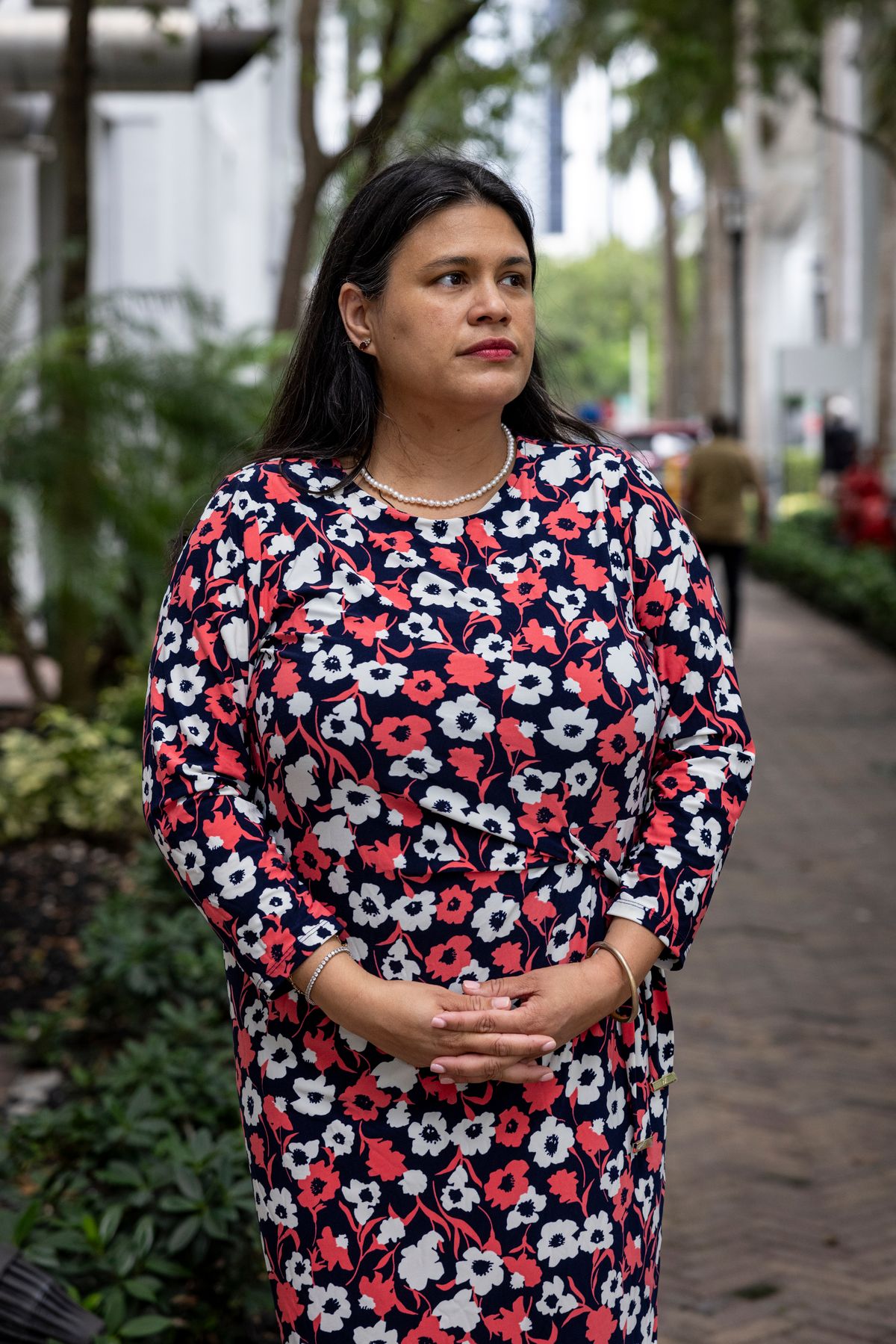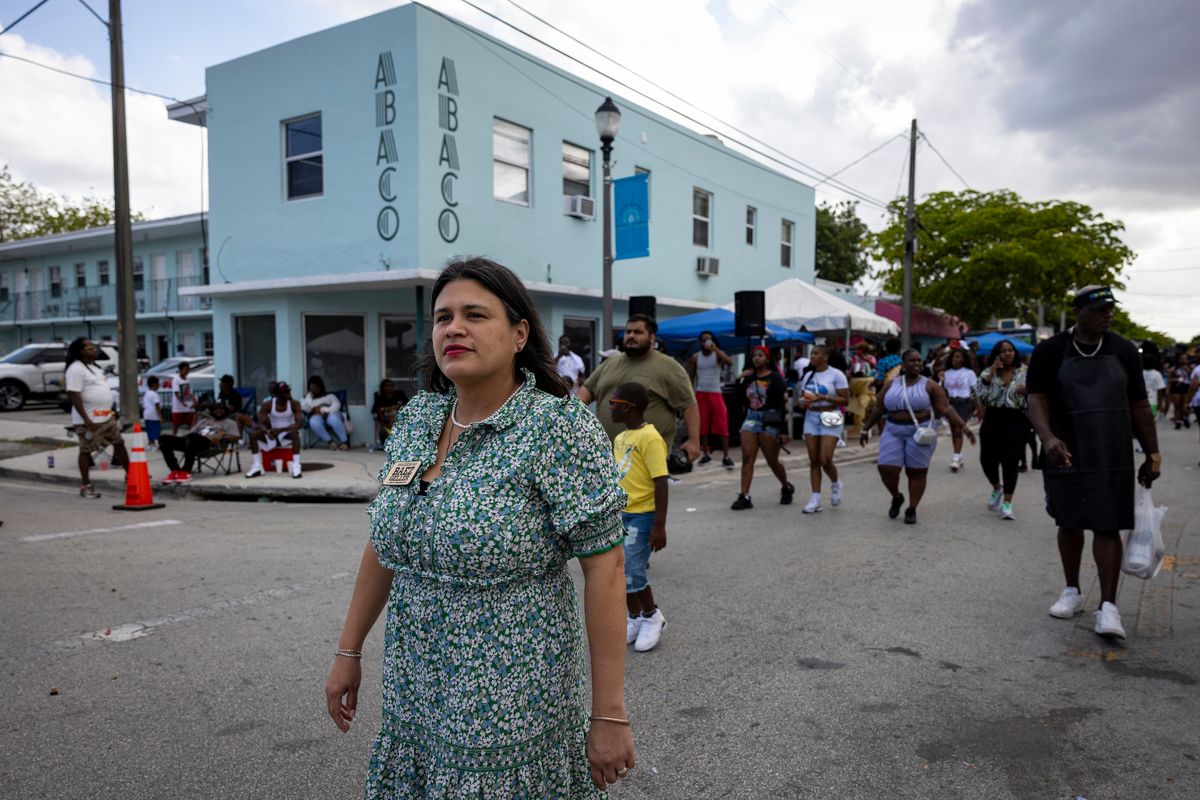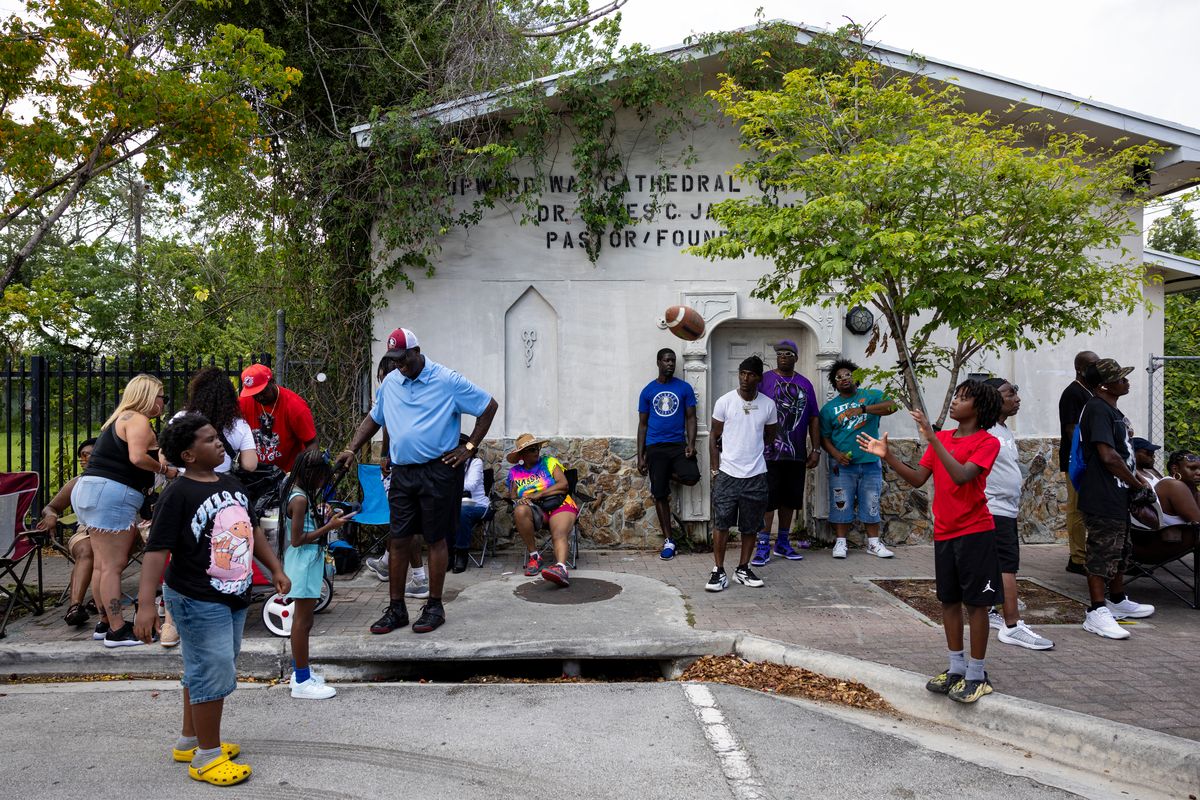Women running for office are talking about their reproductive history, once seen as a liability
Báez-Gellar at the Miami/Bahamas Goombay Festival on June 1. She channeled her anger over Florida adoption of one of the strictest abortion bans in the United States into running for office. She has talked about her experiences to try to “humanize” abortion. MUST CREDIT: Eva Marie Uzcategui for The Washington Post (Eva Marie Uzcategui/For The Washington Post)
Lucia Báez-Geller was “over the moon” when she found out about two years ago she was pregnant with her second child. After having her first child at 39, she started trying for another as soon as she was cleared to by her doctors.
“I really thought that nothing could go wrong because my first pregnancy had gone so well,” she said. But just weeks into her second pregnancy, doctors told her that it was not progressing normally and the pregnancy was nonviable. Her doctors presented her with three options: dilation and curettage, a brief surgery to dilate the cervix and scrape tissue from the uterus; a medication abortion pill her doctors described as having the potential to be extremely painful; or to wait for a potentially risky natural miscarriage.
Báez-Geller, who lives in Miami, elected for the surgery, performed when she was 12 weeks pregnant. A year later, she fears that she could be denied the same procedure under Florida’s six-week abortion ban, despite the law’s exception for fatal fetal anomalies – which some women say they have struggled to navigate.
If she was turned down for care in Florida, Báez-Geller said through tears, she and her family would have probably had to travel roughly 800 miles to Virginia, the closest state where she thought she could get such a procedure, emphasizing the added pressure that would have put on her and her family.
“It would have been devastating,” she said.
Báez-Geller, 41, has funneled her anger over the law change into a run for a competitive U.S. House seat in a district near Miami. Ahead of Tuesday’s primary, where she was victorious, she has said she wants to “humanize the issue” of abortion, leaning into her personal story and talking about her failed pregnancy on the campaign trail when discussing reproductive rights.
Up and down the ballot, women running for office this year are opening up about their own reproductive health, sharing their experiences with IVF, miscarriage and abortion – topics that for years on the campaign trail were considered, at best, uncouth and, at worst, potentially damaging. But after the Supreme Court reversed abortion protections two years ago, that calculus – Can I talk about these deeply personal issues and still win an election? – has changed.
Democrats in particular hope that candidates speaking about their personal experiences will help them connect with voters. Abortion access has proved to be one of the most mobilizing issues for Democratic voters in recent years, with Democrats pointing to wins in red states, like Democratic Gov. Andy Beshear’s reelection in Kentucky and a state House win in Alabama where the Democrat focused heavily on reproductive health care.
Jessica Mackler, the president of Emily’s List – an organization that backs female Democrats who support abortion rights – said there is “heightened imperative” around female candidates sharing their reproductive health stories due to the Dobbs v. Jackson Women’s Health Organization Supreme Court ruling, which overturned the federal right to abortion.
“Women talking about their own stories demonstrates that they have an understanding of these issues that is deep and that they are bringing authenticity to this conversation,” Mackler said. “Voters understand that these are people who are going to stand up and fight for them because they know what it’s like to live in … this post-Dobbs reality.”
After the Dobbs ruling, additional lower court rulings and legislative action spurred even more frank conversations among female candidates.
For Rep. Susie Lee, a front-line Democrat from Nevada who represents part of Las Vegas, the Alabama Supreme Court decision this year that effectively ruled that frozen embryos used in IVF treatments are people was top of mind when deciding to share her personal experiences. After getting the go-ahead from her family, Lee on the campaign trail has discussed her own struggle to get pregnant, including multiple miscarriages and her use of IVF.
“I think as a woman leader, we always say representation matters. And yeah, it does matter when you have a lived experience and you can speak from experience,” Lee said. “Making sure that women have that full slate of options is really important to me because having gone through multiple miscarriages, all of this is very personal, and it’s not a black-and-white issue.”
The Alabama ruling was also influential for Caitlin Draper, a Democrat running for Congress in Arkansas, who sped up her own IVF process because she was concerned the ruling could foreshadow similar changes in her state.
“Honestly, we got scared and we’re like, ‘Well, let’s just do it,’” Draper said of conversations with her husband. She got pregnant but quickly learned the pregnancy was not viable and worried about how Arkansas’ near-total ban on abortion might affect her medical options there.
She said she felt compelled to share her experience out of anger and concern for women who couldn’t travel out of state, if needed, like she could.
“Sharing personal health details or personal family struggles [in the past] would not have been something that advisers would have told women to do. They probably would have told women to keep those things secret,” said Amanda Hunter, executive director of the Barbara Lee Family Foundation, who said the organization has observed the trend growing over the last decade, particularly since the #MeToo movement.
But the overturning of Roe v. Wade marked a milestone, Hunter said: “The Dobbs decision was a watershed when it comes to women sharing stories of their own reproductive health-care journey.”
“When some women feel comfortable sharing these stories, it’s going to show other women that it’s okay to do that and encourage them to also share their stories,” she said.
The trend has also extended to men and Republican candidates. Minnesota Gov. Tim Walz, the new Democratic nominee for vice president, has been public about his family’s struggle to conceive. He has shared the story at campaign rallies since joining the ticket and at closed-door fundraisers addressing Democratic donors.
“This gets personal for me and my family. When my wife and I decided to have children, we spent years going through infertility treatments. And I remember praying every night for a call for good news, the pit in my stomach when the phone rang and the agony when we heard that the treatments hadn’t worked,” Walz said in his first appearance with Vice President Kamala Harris, the Democratic nominee, in Philadelphia earlier this month. “So, it wasn’t by chance that when we welcomed our daughter into the world, we named her Hope.”
While campaigning in the Republican presidential primary, former U.N. ambassador Nikki Haley regularly mentioned her challenges having children while explaining her position on abortion. After the Alabama Supreme Court’s ruling on IVF, she discussed getting pregnant with her son via artificial insemination.
“I had trouble having both of my children. Both of my children – we were blessed – were due to fertility treatments. We need to make sure that every state in the country allows these parents their access to IVF,” Haley said at a rally in February.
Florida Gov. Ron DeSantis (R) also spoke during the presidential primary about his wife Casey’s miscarriage and its impact on his family, and tech entrepreneur Vivek Ramaswamy shared that his wife, Apoorva, had also suffered a miscarriage. Nevada Republican Senate candidate Sam Brown sat by his wife in an interview earlier this year where she described having an abortion before they met, and Rep. Michelle Steel (R-Calif.) said earlier this year that she does not support federal restrictions on IVF because it allowed her to start her family.
Still, the effort to speak more openly about reproductive health is undoubtedly more pronounced among Democratic candidates.
New Hampshire congressional candidate Maggie Goodlander, 37, decided to share the story of her stillbirth in the first video she released announcing her campaign in the state’s 2nd District.
After becoming pregnant, testing after 19 weeks showed Goodlander’s fetus was in critical condition, and she and her husband, Biden administration national security adviser Jake Sullivan, were told to see a maternal fetal medicine doctor, but struggled to get an appointment. Goodlander said she was further concerned about complications because of her age and preexisting conditions, including rheumatoid arthritis and alopecia areata.
When Goodlander was finally able to get an appointment, she said, she had low amniotic fluid and was sent for an MRI. She was eventually diagnosed with placenta previa, a condition in which the placenta either partly or fully covers the cervix, creating another set of complications.
The fetus died in her womb, and she was sent for a two-day removal process.
“The first day they put stakes into your cervix, that’s the dilation piece, and then the next day is the evacuation piece – the language around this is so horrible,” Goodlander recounted in an interview with The Washington Post. But the procedure came too late, Goodlander said, and after the first step, she delivered her stillborn child herself in a hotel bathroom near the hospital in Boston.
“It is the most unimaginably heart wrenching, and, you know, traumatic set of experiences you can go through,” Goodlander said.
“The idea that anyone other than the patient, the family, the provider would be involved is just unimaginable to me. And what we see are extreme politicians and extreme judges placing themselves in between patients and providers and sowing chaos and ripping away rights and risking lives,” she said. The experience “really informed the energy I’m going to put into addressing every nook and cranny” of the issue, she said.
Goodlander’s campaign launch video, which also featured her mother who ran for Congress when she was a child, underscores how times have changed for female candidates and their ability to share their personal lives as candidates.
“When my mom ran for the seat, her opponent’s slogan [was] ‘A woman’s place is in the home, not in the House.’ And one of the biggest critiques of her was that I, a 2-year-old, was at home,” Goodlander said. “I’m so grateful to all the women who came before us, who paved the way and really flipped the script.”



